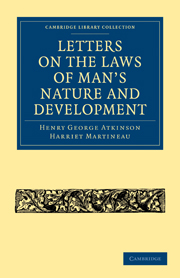Book contents
- Frontmatter
- Preface
- Mottoes
- Contents
- Letter. 1 Inquiry for a Basis
- Letter. 2 Proposal of a Basis
- Letter. 3 Preparation of the Ground
- Letter. 4 What is the Brain?
- Letter. 5 Inquiry about its Structure
- Letter. 6 Early days of Phrenology
- Letter. 7 Inquiry for New Discoveries
- Letter. 8 Methods of New Discovery. Organic Arrangement of the Brain
- Letter. 9 Illustrative Cases
- Letter. 10 Organic Arrangement of the Cerebrum
- Letter. 11 Dr. Howe's Report on Idiocy
- Letter. 12 The Senses and Nervous System
- Letter. 13 Illustrative Comment
- Letter. 14 Facts about the Senses under various conditions
- Letter. 15 Raising questions
- Letter. 16 Bacon, on Matter and Causation. Inferences and Dreams. Association of Ideas
- Letter. 17 Nothing
- Letter. 18 Knowledge and Notions. Results of each
- Letter. 19 Release from Notions. Entrance upon Knowledge
- Letter. 20 Natural History of Superstition
- Letter. 21 Theology and Science
- Letter. 22 Central Law and Pervasive Unity. Light. Sense of Identity. Ghost-seeing. Unrevealed Human Relations
- Letter. 23 Position and Privilege of Truth-seekers
- Letter. 24 Position and Privilege of Truth-speakers
- Appendix
Letter. 13 - Illustrative Comment
Published online by Cambridge University Press: 29 August 2010
- Frontmatter
- Preface
- Mottoes
- Contents
- Letter. 1 Inquiry for a Basis
- Letter. 2 Proposal of a Basis
- Letter. 3 Preparation of the Ground
- Letter. 4 What is the Brain?
- Letter. 5 Inquiry about its Structure
- Letter. 6 Early days of Phrenology
- Letter. 7 Inquiry for New Discoveries
- Letter. 8 Methods of New Discovery. Organic Arrangement of the Brain
- Letter. 9 Illustrative Cases
- Letter. 10 Organic Arrangement of the Cerebrum
- Letter. 11 Dr. Howe's Report on Idiocy
- Letter. 12 The Senses and Nervous System
- Letter. 13 Illustrative Comment
- Letter. 14 Facts about the Senses under various conditions
- Letter. 15 Raising questions
- Letter. 16 Bacon, on Matter and Causation. Inferences and Dreams. Association of Ideas
- Letter. 17 Nothing
- Letter. 18 Knowledge and Notions. Results of each
- Letter. 19 Release from Notions. Entrance upon Knowledge
- Letter. 20 Natural History of Superstition
- Letter. 21 Theology and Science
- Letter. 22 Central Law and Pervasive Unity. Light. Sense of Identity. Ghost-seeing. Unrevealed Human Relations
- Letter. 23 Position and Privilege of Truth-seekers
- Letter. 24 Position and Privilege of Truth-speakers
- Appendix
Summary
H. M. to H. G. A.
Some parts of this last letter of yours please me greatly, and set one collecting one's experiences and old speculations under the new classifications in a way I enjoy. You must know I was a devout student of Hartley, all my youth through; and a clinging believer in him for long after I had passed my youth. It is astonishing to me now that I could admit without question his supposition that Man has two primary powers which are enough to account for everything; the capacity for pleasure and pain, and the principle of association. He does not even seem to think of the desire of pleasure and the fear of pain, which surely do not come under either of his two heads. It is the exquisite morale of the man, his heavenly temper and holy conscientiousness, which lead one away to think as he thinks, and feel as he feels.—All the while, I was despising the Scotch metaphysicians—as I still think they deserve—for classifying and illustrating interminably, without having ascertained any basis whatever. Hartley had a grasp of something, however inadequate: they, of nothing,—unless, indeed, it were a clumsy method of declaring that Man has intuitions.—In the midst of all this,—in the midst of exhibitions of a sort of compartments of an immaterial Mind, called respectively Memory, Imagination, Judgment, and so on, stood out before me suddenly Dr. Thomas Brown's discovery of the Muscular Sense,—a curious piece of reality amidst a symmetrical array of suppositions! After this, one could never more be satisfied to lump together, under the name of one sense, things so different as perceptions of temperature, resistance, muscular ease or ache, and acute physical pain or pleasure, sensations of touch, &c.
- Type
- Chapter
- Information
- Letters on the Laws of Man's Nature and Development , pp. 118 - 126Publisher: Cambridge University PressPrint publication year: 2009First published in: 1851

